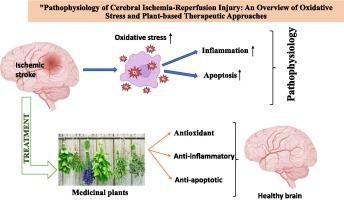Pathophysiology of cerebral ischemia-reperfusion injury: An overview of oxidative stress and plant-based therapeutic approaches
IF 2.7
4区 医学
Q3 NEUROSCIENCES
引用次数: 0
Abstract
Stroke is a debilitating neurological disorder that causes substantial morbidity and mortality on a global scale. Ischemic stroke, the most common type, occurs when the brain’s blood supply is interrupted. Oxidative stress is a key factor in stroke pathology, contributing to inflammation and neuronal cell death. As a result, there is increasing interest in the potential of plant extracts, which have been used in traditional medicine for centuries and are generally considered safe, to serve as alternative or complementary treatments for stroke. The plant extracts can target multiple pathological processes, including oxidative stress, offering neuroprotective effects. The development of highly efficient, low-toxicity, and cost-effective natural products is crucial for enhancing stroke treatment options. In this review, we examine 60 plant extracts that have been focused on the studies published from year 2000 to 2024 along with the studies’ experimental models, dosages, and results. The plant extracts hold promise in modulating cerebral ischemia–reperfusion injury through counteraction of relevant pathophysiologic processes such as oxidative stress.

脑缺血再灌注损伤的病理生理学:氧化应激和植物治疗方法概述。
中风是一种使人衰弱的神经系统疾病,在全球范围内造成大量的发病和死亡。缺血性中风是最常见的类型,发生时大脑供血中断。氧化应激是中风病理的一个关键因素,会导致炎症和神经细胞死亡。因此,人们越来越关注植物萃取物作为中风替代或辅助疗法的潜力,因为植物萃取物在传统医学中已使用了几个世纪,而且被普遍认为是安全的。植物提取物可针对多种病理过程,包括氧化应激,提供神经保护作用。开发高效、低毒、成本效益高的天然产品对提高中风治疗效果至关重要。在这篇综述中,我们对 2000 年至 2024 年间发表的 60 项植物提取物研究进行了重点研究,并对研究的实验模型、剂量和结果进行了分析。这些植物提取物有望通过对抗氧化应激等相关病理生理过程来调节脑缺血再灌注损伤。
本文章由计算机程序翻译,如有差异,请以英文原文为准。
求助全文
约1分钟内获得全文
求助全文
来源期刊

Brain Research
医学-神经科学
CiteScore
5.90
自引率
3.40%
发文量
268
审稿时长
47 days
期刊介绍:
An international multidisciplinary journal devoted to fundamental research in the brain sciences.
Brain Research publishes papers reporting interdisciplinary investigations of nervous system structure and function that are of general interest to the international community of neuroscientists. As is evident from the journals name, its scope is broad, ranging from cellular and molecular studies through systems neuroscience, cognition and disease. Invited reviews are also published; suggestions for and inquiries about potential reviews are welcomed.
With the appearance of the final issue of the 2011 subscription, Vol. 67/1-2 (24 June 2011), Brain Research Reviews has ceased publication as a distinct journal separate from Brain Research. Review articles accepted for Brain Research are now published in that journal.
 求助内容:
求助内容: 应助结果提醒方式:
应助结果提醒方式:


